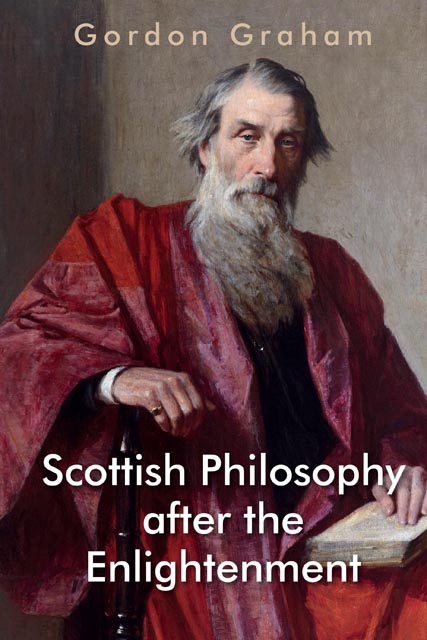Book contents
- Frontmatter
- Contents
- Preface and Acknowledgements
- Series Editor’s Introduction
- A Note on Women in Scottish Philosophy: Mrs Oliphant
- A Chronology of Scottish Philosophy after the Enlightenment
- 1 An Autobiographical Prologue
- 2 Sir William Hamilton and the Revitalisation of Scottish Philosophy
- 3 James Frederick Ferrier and the Course of Scottish Philosophy
- 4 Psychology and Moral Philosophy: Alexander Bain
- 5 Thomas Carlyle and the Philosophy of Rhetoric
- 6 Hegelianism and its Critics
- 7 Scottish Philosophy’s Progress
- 8 Religion, Evolution and Scottish Philosophy
- 9 The Gifford Lectures and the Re-affirmation of Theism: Alexander Campbell Fraser
- 10 The Culmination of Scottish Philosophy: A. S. Pringle-Pattison
- 11 John Macmurray and the Self as Agent
- Bibliography
- Index
8 - Religion, Evolution and Scottish Philosophy
Published online by Cambridge University Press: 07 June 2023
- Frontmatter
- Contents
- Preface and Acknowledgements
- Series Editor’s Introduction
- A Note on Women in Scottish Philosophy: Mrs Oliphant
- A Chronology of Scottish Philosophy after the Enlightenment
- 1 An Autobiographical Prologue
- 2 Sir William Hamilton and the Revitalisation of Scottish Philosophy
- 3 James Frederick Ferrier and the Course of Scottish Philosophy
- 4 Psychology and Moral Philosophy: Alexander Bain
- 5 Thomas Carlyle and the Philosophy of Rhetoric
- 6 Hegelianism and its Critics
- 7 Scottish Philosophy’s Progress
- 8 Religion, Evolution and Scottish Philosophy
- 9 The Gifford Lectures and the Re-affirmation of Theism: Alexander Campbell Fraser
- 10 The Culmination of Scottish Philosophy: A. S. Pringle-Pattison
- 11 John Macmurray and the Self as Agent
- Bibliography
- Index
Summary
I
The traditional teleological argument for the existence of God, commonly known as ‘the design argument’, aims to ground belief in God’s existence in empirical evidence drawn from the world around us. The most telling items of evidence to which this argument appeals are biological organs that serve specific functions superbly well. The eye, to cite a frequently used example, serves the purpose of seeing so impressively, it seems impossible that it could have arisen by chance. Rather, it must have been brought into existence for that purpose by an intentional designer, which is to say, God.
David Hume’s Dialogues Concerning Natural Religion, it is widely accepted, constitute an exhaustive and devastating critique of this argument. The characters engaged in dialogue debate a very modest version of the conclusion that the design argument might be held to sustain, namely, ‘That the Author of Nature is somewhat similar to the mind of man’. Yet ultimately, even this very limited claim is found to be wanting. The design argument, which had widespread appeal in Hume’s own day, is wholly lacking in cogency, it seems.
In the Dialogues, the character who articulates and defends the design argument is Cleanthes. The character who undermines it is Philo. Somewhat strangely, however, in the opening paragraphs of the final part of the work Philo, the sceptic, suddenly seems to endorse the very conclusion he has been attacking. He remarks to Cleanthes:
[N]otwithstanding the freedom of my conversation, and my love of singular arguments, no one has a deeper sense of religion impressed upon his mind … [by] the inexplicable contrivance and artifice of nature. A purpose, an intention, a design strikes everywhere the most careless, the most stupid thinker, and no man can be so hardened in absurd systems, as at all times to reject it. (Hume 1993: 116)
Is this really a volte-face? Is Philo in the end unpersuaded by the arguments he himself has made? The quoted passage has often been interpreted in this way, but there is at least one interpretation that makes the reversal a little less dramatic. Possibly, Philo is here giving voice to a lingering psychological doubt. The key lies in the word ‘inexplicable’ and in the phrase ‘at all times’.
- Type
- Chapter
- Information
- Scottish Philosophy after the Enlightenment , pp. 147 - 166Publisher: Edinburgh University PressPrint publication year: 2022



